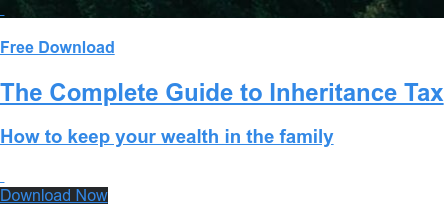Very frequently financial advisers will say to clients “if you want your beneficiaries to pay less inheritance tax (IHT) upon your death, make sure you spend it or give it away earlier”. However, sometimes this might not be the most sensible option. Or perhaps the idea of giving away capital when so much in life is uncertain causes anxiety. It is important to find a balance between having enough to feel secure and avoiding hefty estate taxes. Whatever happens, you do not want your savings to run out but, equally, we need to plan to ensure that your loved ones will benefit rather than paying more tax than necessary.
Whatever happens, you do not want your savings to run out but, equally, we need to plan to ensure that your loved ones will benefit rather than paying more tax than necessary.
It can seem like a conundrum, but one very simple solution could be to set up a trust and lend the Trustees, interest-free, some capital. A trust is a legal arrangement and there are many ways it can be setup. In this instance, the Trustees would invest the money, very often into an investment bond which is a non-income-producing investment and sheltered from capital gains tax; a friendly wrapper for trusts. The Trustees would be responsible for the loan and it would be repayable on demand to you, the lender.
The benefit of this arrangement is that any growth generated from the bond becomes an asset of the trust. You, the lender, do not have an interest in this element of the trust, but simply the original loan. The growth sits outside the lender’s estate.
This may not at first seem very exciting. However, if you imagine that the investment compounded in value at 5% per annum over the next 10-15 years, the difference in value can be quite substantial. Ordinarily, if the lender had not taken this step and simply invested the capital in their own name, the estate and potentially the IHT bill would simply become larger.
As mentioned before, as the lender you still have protection because the loan is always repayable to the estate. The Lender of the money can always request repayments of the loan at any time either by a series of partial withdrawals or something more regular. This generally gives the lender peace of mind, knowing that capital is available if needed. The liability of the Trustees is limited to the value of the investment bond.
Trustees and Beneficiaries
Your Trustees will be responsible for the administration of your arrangement, with the help of your financial advisers. Your Trustees are also responsible for determining who benefits from the trust. Therefore, selecting your Trustees wisely is important. Very often an expression of wish is lodged with the Trustees to help guide them as to whom the proceeds should be distributed and how much. To be effective for IHT planning, the lender should not be a potential beneficiary of the trust.
Repaying the Loan
As mentioned earlier, the lender can always ask for the return of the loan at any time. Any withdrawals made within the normal 5% deferred allowance within the investment bond are treated as a repayment of capital and do not initially stimulate a chargeable event to UK income tax.
The loan trust arrangement does not completely avoid IHT liability, it simply freezes the value of the capital lent to the Trustees thus preventing the liability from increasing. On the death of the lender, any outstanding debt that has not been repaid is recovered by the estate from the Trustees, leaving the growth within the trust.
Should you consider this?
This type of arrangement is attractive to those nearing or already retired who want to invest capital for the long term benefit of their next of kin, whilst not waving goodbye to their capital. It allows clients to reduce IHT by giving beneficiaries the gains from their investment outside of their estate. Over time this can be amount to a significant sum that is well worth considering, especially for those who are keen to keep their options open.
If you would like any further details please contact your adviser, or if you are new to Quadrant Group simply contact me on our office number 0208 954 4466, or email [email protected].
This article does not constitute financial advice. Individuals must not rely on this information to make a financial or investment decision. Before making any decision, we recommend you consult your financial planner to take into account your particular investment objectives, financial situation and individual needs. Past performance is not a guide to future performance. The value of an investment and the income from it may go down as well as up and investors may not get back the amount originally invested. This document may include forward-looking statements that are based upon our current opinions, expectations and projections.







